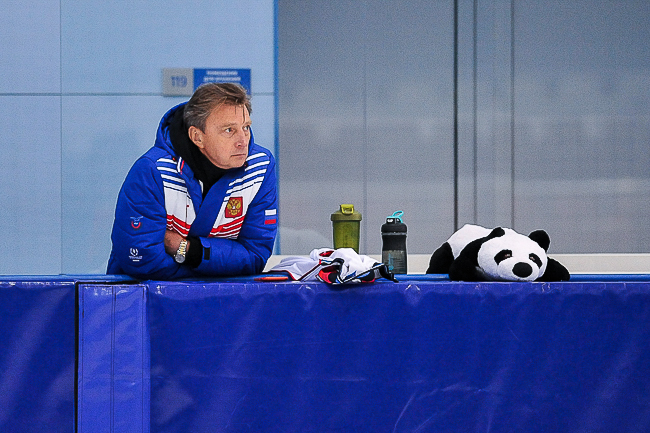Oleg Vasiliev: Former coaching staff loses money from shows and ad if the athlete leaves
Interview with Oleg Vasiliev. The specialist told why personal contracts won’t stop athletes from transfers in Russia, why he’s never had such contracts with his skaters and explained the hype surrounding Aliona Kostornaia’s change of coach.
by Elena Vaitsekhovaskaya for russian.rt.com dd. 27th August 2020

You spent your entire sports career in the group of Tamara Moskvina. In those years, there were no talks about any contracts between the athlete and the coach, right?
Oleg Vasiliev: Nevertheless, such contracts existed. For some they were written, for others – oral, but the mutual relationship between the coach and the athlete was always discussed in the Moskvina group.
Did this relationship imply a compensation in case the athlete expresses a desire to switch for another specialist?
Oleg Vasiliev: No. Our contracts in a very succinct form outlined the activities of a specialist on the one hand. On the other hand, the athlete’s financial obligations, which consisted in paying of a certain percentage of earnings – prize money, advertising, and so on.
Do all specialists have similar agreements in figure skating?
Oleg Vasiliev: I don’t think so. For example, when I became a coach, I have never had any written agreements with my athletes. We discussed some things and adhered to these agreements. This form of relationship seemed more correct to me. Firstly, I believed that human relationships are more important than any pieces of paper. And secondly, I understood perfectly well that if an athlete does not want to continue working with me, he will still leave, regardless of any initial obligations, be they written or oral.
Could the contract system, for which many of your colleagues are advocating now, hinder an athlete to move from coach to coach, or at least provide a penalty?
Oleg Vasiliev: It seems to me that we are approaching the solution of the problem from the wrong side. Let’s not forget that in our country sports are funded by the state. Each coach and each athlete, as a rule, receives a salary from several sources: from the Ministry of Sports, from the club in which he works, and from the Olympians support fund. In addition, the skater receives equipment, ice, medical care, plus the state pays for all the specialists he needs. What contracts “coach – athlete” can we talk about, if there are no direct commodity-money relations between people?
Is this the main difference between the Russian training system and the one they have in the West?
Oleg Vasiliev: Quite right. The contract system may well exist in the USA or Canada, since the athlete pays for the coach’s work there. From his own pocket or from sponsorship – it doesn’t matter. Therefore, all financial relations there are as transparent as possible. If the athlete decides to transfer somewhere, the new coach will never take him, without making sure first that all monetary issues with the previous specialist are fully resolved. This is a rule that has been in American figure skating for 25 or 30 years.
Our system is arranged differently. If an athlete at some point of his career starts to believe that his work with a certain specialist has reached its limits, that in terms of professional and personal growth he can get more from another coach, then he leaves. A new coach will get money for working with him, but only if the transfer is made within the framework of the transfer window. For this, in fact, it exists.
What happens if a skater decides to leave the coach after the transfer window closes?
Oleg Vasiliev: If an athlete did not manage to transfer from one group to another on time, that is, before June 1, then the salary and all additional bonuses for working with him will be paid to the former coach. The new one, it turns out, will have to work the season almost for free.
Why, then, was there such a great hype around Alena Kostornaia’s transition from Eteri Tutberidze to Evgeni Plushenko?
Oleg Vasiliev: Apparently, because in addition to government salaries and grants, there are other sources of income: prize money earned by an athlete at competitions, money for performing in certain shows and advertising contracts. And the former coaching staff loses this money if the athlete leaves. This is painful and offensive, especially when it comes to a titled and sought-after skater, but this is how reality works.
Related topics: Alena Kostornaia, Oleg Vasiliev

Leave a Reply